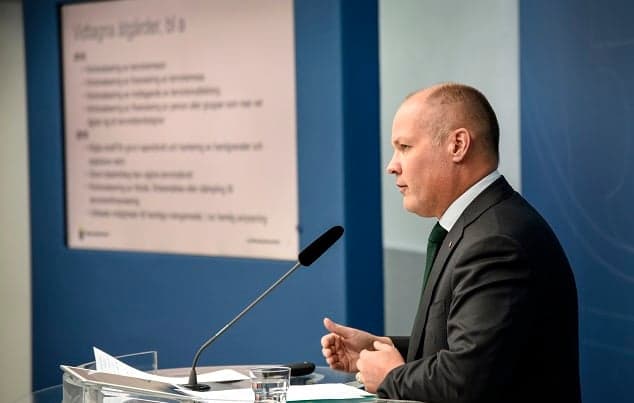Setback for Sweden's proposed anti-terror laws

Plans from the Swedish government to make it illegal to be part of a terrorist organization have hit an obstacle, with the country's legislative council saying the proposal goes against the Swedish constitution.
The proposed law could be incompatible with the constitutional right to freedom of association, according to the Council on Legislation, an agency tasked with evaluating the legal validity of law proposals.
"The council therefore finds that it cannot approve the referred proposal being forward," it wrote in its decision.
The government had proposed introducing two new anti-terror laws: one making it illegal to be participate in a terrorist organization, and one making it illegal to cooperate with these organizations. Currently it is only possible to prosecute members of such groups if there is evidence of other crimes, such as incitement to terror, travelling internationally for terrorist purposes, or training or recruiting people to carry out terrorist crimes.
READ MORE: Sweden moves to tighten anti-terror laws: five key things to know
Under the proposal, the punishment would be up to six years' imprisonment for crimes classified as 'aggravated', and up to two years in other cases.
"We will discover more cases of those who commit these crimes. It will be easier to map the networks themselves," Justice Minister Morgan Johansson had said when the law was referred to the legislative council for consideration.
However, lawyers had already raised the issue of potential incompatible with Sweden's constitutional freedom of association.
"There needs to be proportionality between the goal and the means, ie suppressing terrorism. The efficiency [of the law] might be low. It's hard to formulate legislation which is firm without it becoming too great a restriction of freedom association," Ingrid Melmius, a senior law lecturer at Uppsala University, previously told TT.
The legislative council's decisions are advisory and non-binding, but the government often clarifies legislation based on the council's suggestions, which can delay the date at which they come into force. Swedish Prime Minister Stefan Löfven had earlier said he hoped to be able to put the proposal to parliament relatively soon, with the aim of having the law come into force on August 1st.
Terrorism experts have previously pointed out that Sweden acted late compared to many other countries in introducing a ban on participating in such organizations. The law cannot be applied retroactively and so will not apply to many Swedes who left the country to join Isis but are expected to return to Sweden.
Comments
See Also
The proposed law could be incompatible with the constitutional right to freedom of association, according to the Council on Legislation, an agency tasked with evaluating the legal validity of law proposals.
"The council therefore finds that it cannot approve the referred proposal being forward," it wrote in its decision.
The government had proposed introducing two new anti-terror laws: one making it illegal to be participate in a terrorist organization, and one making it illegal to cooperate with these organizations. Currently it is only possible to prosecute members of such groups if there is evidence of other crimes, such as incitement to terror, travelling internationally for terrorist purposes, or training or recruiting people to carry out terrorist crimes.
READ MORE: Sweden moves to tighten anti-terror laws: five key things to know
Under the proposal, the punishment would be up to six years' imprisonment for crimes classified as 'aggravated', and up to two years in other cases.
"We will discover more cases of those who commit these crimes. It will be easier to map the networks themselves," Justice Minister Morgan Johansson had said when the law was referred to the legislative council for consideration.
However, lawyers had already raised the issue of potential incompatible with Sweden's constitutional freedom of association.
"There needs to be proportionality between the goal and the means, ie suppressing terrorism. The efficiency [of the law] might be low. It's hard to formulate legislation which is firm without it becoming too great a restriction of freedom association," Ingrid Melmius, a senior law lecturer at Uppsala University, previously told TT.
The legislative council's decisions are advisory and non-binding, but the government often clarifies legislation based on the council's suggestions, which can delay the date at which they come into force. Swedish Prime Minister Stefan Löfven had earlier said he hoped to be able to put the proposal to parliament relatively soon, with the aim of having the law come into force on August 1st.
Terrorism experts have previously pointed out that Sweden acted late compared to many other countries in introducing a ban on participating in such organizations. The law cannot be applied retroactively and so will not apply to many Swedes who left the country to join Isis but are expected to return to Sweden.
Join the conversation in our comments section below. Share your own views and experience and if you have a question or suggestion for our journalists then email us at [email protected].
Please keep comments civil, constructive and on topic – and make sure to read our terms of use before getting involved.
Please log in here to leave a comment.